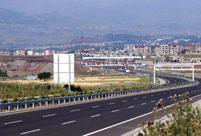ABUJA, May 8 -- The volume of illicit outflows of financial resources has been estimated to reach 50 billion U.S. dollars annually, said a report released Wednesday during the World Economic Forum (WEF) on Africa.
It said that amount represents almost what the continent might expect to receive foreign direct investments (FDI) in a year.
The report called "Africa is Rising: Inequalities and the Essential Role of Fair Taxation," commissioned by the Tax Justice Network and Christian Aid, estimated that Africa lost between 1.2 trillion dollars and 1.3 trillion dollars from these activities between 1980 and 2009.
A panel led by Thabo Mkebi, former South African President held a discussion on the issue of illicit financial flows from Africa and inequalities in Abuja Wednesday on the side of the ongoing WEF.
"Tax Havens" have also been listed by the report as playing a great role in the trade and transfer mispricing which most multinational institutions operating in Africa use to stash away huge profit to avoid being taxed by their host governments.
Not only was commercial tax evasion seen as the cause of Africa' s resource poverty, but also one of the causes of the bleeding points of critical development resources from Africa.
"Illicit financial flows is an African problem that requires global solution. Africa on its own cannot resolve it because it has a demand and supply side for it. Illicit financial flow has serious implications on so many issues," Abdullah Haddock pointed out, deputy executive secretary of the United Nations Economic Commission for Africa (UNECA).
According to him, the situation impacts negatively on the fiscals and revenue of the government. And that has an impact on spending on health, education, infrastructural development of the continent, on issues of employment among others.
Haddock rated capacity on the continent to deal with this challenge as very much behind, thus requiring a lot of hard work in building of the capacity of state institutions, regulatory bodies, banks and institutions that are required to uphold transparency and accountability in order to address the situation.
"It is very serious because, you see, illicit finance has an impact on institutions and it is both a cause and effect. It is a result of weak institutions but, on its own right, it also contributes to weakening of the institutions. So you have this vicious circle," he added.
The international expert added, "We lack the institutions that are professionally trained and that are of the right level that would match the rigor, the quality of those who practice the illicit finance on the continent. The companies, multinationals are using the best brains in the world. So for Africa to match that we need to raise the bar up to that level."
He however expressed confidence in the leadership being provided by Thabo Mbeki and the recommendations that the panel will put forward, would be providing the requisite environment for moving forward, adding that political will was required to overcome the challenge.
Thabo Mbeki on his part commented that leadership was the most critical ingredient lacking in Africa's efforts to deal with the challenge of illicit financial flows.
"The current discussion should therefore also look at the type of leadership the continent needs, because leadership is crucial to all the discussions," the former South African president stated.
 When we are young...
When we are young... Solar halo occurs in Lhasa
Solar halo occurs in Lhasa Photos give cheongsam a new life
Photos give cheongsam a new life Graduates bid farewell to campus in clown costume
Graduates bid farewell to campus in clown costume Badain Jaran Desert: Amazing curves of nature
Badain Jaran Desert: Amazing curves of nature Beautiful Chinese-built roads in Africa
Beautiful Chinese-built roads in Africa High fashion trend welcomed by costumers in Changsha
High fashion trend welcomed by costumers in Changsha About 100 cubs expected to be born in NE China's Siberian Tiger Garden
About 100 cubs expected to be born in NE China's Siberian Tiger Garden China wins 19th women's team title at table tennis worlds
China wins 19th women's team title at table tennis worlds The 'Chinese Dad'
The 'Chinese Dad' Chinese mountaineer's gear list
Chinese mountaineer's gear list  Newly recruited police in Hetian hold drill
Newly recruited police in Hetian hold drill  China's most luminous celebrities
China's most luminous celebrities Top 10 most expensive cars in the world
Top 10 most expensive cars in the world 'African Street' in Guangzhou
'African Street' in GuangzhouDay|Week|Month